Come Holy Spirit, fill the hearts of your faithful and kindle in them the fire of your love. Send forth your Spirit and they shall be created. And You shall renew the face of the earth.
O, God, who by the light of the Holy Spirit, did instruct the hearts of the faithful, grant that by the same Holy Spirit we may be truly wise and ever enjoy His consolations, Through Christ Our Lord, Amen.
"As the Father loves me, so I also love you.
Remain in my love.
If you keep my commandments, you will remain in my love,
just as I have kept my Father's commandments
and remain in his love.
"I have told you this so that my joy may be in you
and your joy might be complete.
This is my commandment: love one another as I love you.
No one has greater love than this,
to lay down one's life for one's friends.
You are my friends if you do what I command you.
I no longer call you slaves,
because a slave does not know what his master is doing.
I have called you friends,
because I have told you everything I have heard from my Father.
It was not you who chose me, but I who chose you
and appointed you to go and bear fruit that will remain,
so that whatever you ask the Father in my name he may give you.
This I command you: love one another."
MEDITATE
As the Father loves me, so I also love you.
Jesus is the incarnation of the Father’s love. In the same way, Jesus is commissioning us to continue his labors of love once his incarnate body leaves the earth. He is calling us to be to him what he is to the Father: the expression of his love. We do this by being a good friend to others, as he is to us. When we relate to others on a level of familiarity, as Christ describes in this passage, we are loving others as the Father loves Jesus.
Remain in my love
Many translations use the word “abide” instead of “remain”. The word “abide” helps us see the eucharistic dimension of Jesus’ teaching here. Last week, we read about the vine and the branches. Jesus said “Abide in Me, and I in you … He who abides in Me, and I in him, bears much fruit” (John 15:4-5). When we receive the Eucharist, Jesus comes to abide in us and we come to abide in him as a part of his Body, the Church. This relationship is founded in love.
Jesus later talks about laying down one’s life as the ultimate act of love. He is drawing the connection between sacrifice and love. When someone we love dies, we often say something like “they will always be a part of me.” Or if someone else notices this, they may say, “he lives on through you.” In a way, Jesus is asking his disciples to do the same for him, to pass on his love when he is gone, even if they don’t see the connection to the crucifixion now. We can take Jesus’ words to heart by frequenting the sacraments, because in them he dwells with us and through us. It is from God alone that we can receive the grace to love others with the sacrificial kind of love with which he loves.
I have called you friends
We have a friend of Jesus, but Jesus is not like other friends. Earlier he said “You are my friends if you do what I command you” (John 15:14). What kind of friend sets that kind of requirement for friendship? That seems kind of condescending of him to say such a thing.
Indeed, it is. Let’s remember who is speaking here. It’s the son of God, the Word made flesh. For him to come down to our level, for him to condescend and relate to us as a friend, is an act of extreme humility on his part. It would be inappropriate, even demeaning, for any other human being to demand that we obey his commandments in order to be his friend. But Jesus is inviting us into a filial relationship with the divine when he sets these requirements.
Also, being a friend is not just about sharing good times. It’s also about being willing to inconvenience yourself when your friend needs you. We should be friends with everyone we love. That may sound obvious, but how often do we think of our family members as friends? Thinking of them as friends, and doing our part to truly be a friend to them, can help us love them. And love is the essence of Christ’s commandments.
It was not you who chose me, but I who chose you
Words like these make people wonder if we even have free will. If God chooses us instead of us choosing our own vocation, then at what point and in what way do we even have the freedom to choose our own path? We’ve probably all heard of the saying, “We choose our own destiny.” But that’s a misleading statement and kind of an oxymoron because if we have a destiny then it is—by definition—already determined, and therefore not really up to us. How do we reconcile our desire for freedom with this idea that our path, or at least our best path, is already set in stone?
We do so by recognizing that God is freedom. Many people may take this verse as a foundational teaching for religious vocations, thereby concluding that God chooses people for the religious life rather than them choosing the life for themselves; but Jesus was talking to his disciples, some of whom were married. At the time of Jesus, our understanding of priests and religious had not been established yet. In fact, the celibate priesthood did not come until hundreds of years later, and even then it was practiced mainly in the Roman Rite.
So when Jesus talks about choosing his disciples, we have to acknowledge that—yes, he is setting them aside for his own work—but there are many ways to do God’s work. In fact, if we choose to do God’s will he will reveal more opportunities for us than we would have discovered on our own. The narrow road is loving God by following his commandments to love others as he has loved us. That’s hard enough to do, especially in today’s world. But in the Father’s House there are many rooms (John 14:2).
PRAY
Jesus, teach us to love as you love, willing to sacrifice that which we cherish. We pray that you also give us the grace to be the kind of friend someone needs, the kind who is willing to drop everything to help out and not count the cost. Bring us to your heavenly kingdom on the narrow way, putting others before ourselves so we could better know you and the way you love. In Jesus’ name we pray. Amen.
LISTEN
The words “I love you” would fall flat if they came from someone who did not show it with their actions. Similarly, God shows his love through his actions in everything around us. All we need to do is be silent and take it in, and we will receive the grace we need to love as he loves, and thereby follow his commandment to love without expecting anything in return.
Glory Be to the Father, and to the Son, and to the Holy Spirit. As it was in the beginning, is now, and ever shall be, world without end. Amen.
About the Author:
David Kilby is a freelance writer from New Jersey and managing editor of Catholic World Report. He received his undergrad degree in humanities and Catholic culture from the Franciscan University of Steubenville. In addition to working with the Knights of the Holy Eucharist (knights.org), he has served as a journalist for Princeton Packet Publications, and the Trenton Monitor, the magazine for the Diocese of Trenton. Some of his published work can also be found in St. Anthony Messenger, Catholic Herald (UK), and Catholic World Report. For the latter he is managing editor. Find more of his writing at ramblingspirit.com


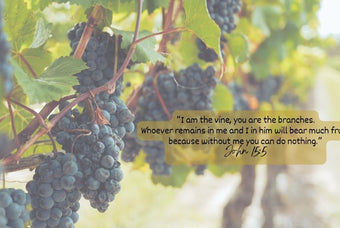


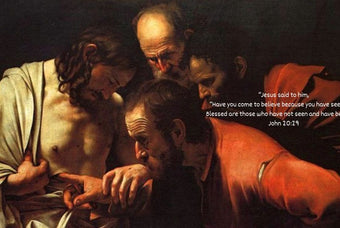

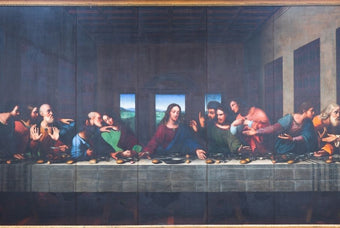
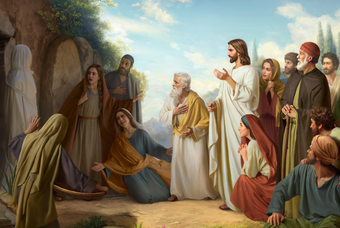



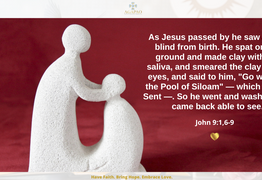




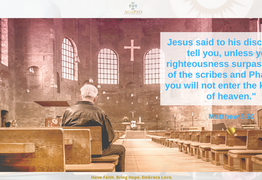



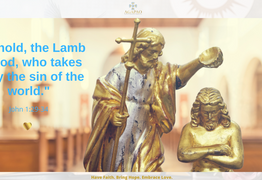










































0 comment. Write a comment